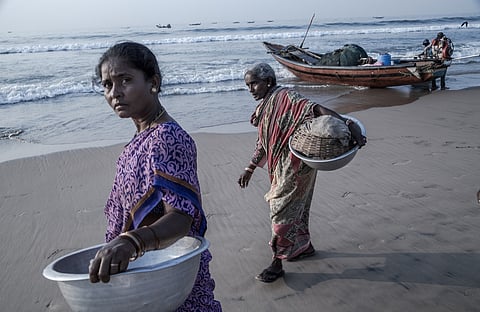Cyclones, caste, and the price of dignity: When Odisha’s fisherwomen refuse shelter
When cyclone winds rise over the Bay of Bengal, Odisha’s state machinery moves with an efficiency that has become the envy of disaster management worldwide. From the 1999 super-cyclone to Fani in 2019, the state has earned praise for saving lives through early warnings, swift evacuation, and disciplined coordination. Yet, beneath this celebrated success, lies a truth too often ignored: even the best preparedness cannot protect people from the everyday storms of caste.
Last week, as Cyclone Montha approached the coast, fisherwomen from Rambha, a settlement on the southern edge of Chilika Lake, stood their ground in defiance. “We will not go,” they told a journalist who asked whether they would shift to the government rehabilitation centre. “Everyone eats the fish we catch,” one woman said, her voice heavy with fatigue and pride, “but they will not touch us.” Another added, “During temple festivals, we are kept out. In the shelter too, the Odia loka (upper caste people) hate us, sit apart, and take all the food first. We get only the leftovers. Even if we die, we will not go there again.”
The journalist pressed further: “This baṭy sthal (cyclone rehabilitation) centre is arranged by the government, so why is caste discrimination happening here?” The women replied in one voice:
“Yes, it is arranged by the government. But before we, the affected fisher community, reach the centre, the high caste people occupy it and take over the place. Untouchability always happens. We are the fisher community; tell us, who faces more risk—those of us living by the sea, or the people in the main village? Yet the high caste people dominate the rehabilitation space, and no one listens.”
This collective refusal is more than an act of resistance; it exposes the central paradox of climate adaptation in a caste society. The fisher communities of Chilika, mostly from the Scheduled Castes and marginalised OBC groups, live on the front line of every climate disaster. They lose homes, boats and livelihoods first. Yet when the state opens its cyclone shelters, social hierarchies decide who occupies which corner, who eats first, and who remains untouchable, even amid a shared catastrophe.
The sociology of a storm
Economists describe climate change as a threat multiplier; it amplifies existing inequalities. In Odisha’s coastal villages, caste itself is the oldest climate variable. It determines who lives on low-lying land, who can afford brick houses instead of thatched huts, who receives early relief and whose suffering stays invisible. When a fisherwoman says, “Self-respect is more important than safety,” she is not choosing death; she is asserting life on her own moral terms.
Odisha’s cyclone-resilient infrastructure, though admirable, still carries the social logic of exclusion. Many shelters stand on land donated by dominant caste households; local committees are chaired by men who view hierarchy as natural order; and relief distribution often follows social proximity rather than vulnerability. These are not failures of planning but failures of empathy, the endurance of a moral economy that ranks human worth by birth.
Beyond disaster management
The Rambha episode should compel policymakers to rethink what “resilience” truly means. Resilience is not only the ability to rebuild houses but the ability to rebuild dignity. If a Dalit or fisherwoman cannot enter a government shelter without humiliation, then our cyclone-management model is neither inclusive nor humane. Climate adaptation cannot stand on the foundations of social apartheid.
The moral economics of climate suffering
The women of Rambha remind us that climate change is not merely a meteorological event; it is a moral one. The winds that flatten homes also lay bare the hierarchies embedded in our social order. Their refusal to seek shelter is both tragic and revolutionary: an indictment of a caste system that outlives every reform, and a warning to those who measure resilience only in GDP or evacuation counts.
If the state wants its people to seek safety, it must first make safety a space of dignity. Until then, as the next cyclone gathers strength over the Bay of Bengal, many like those fisherwomen will stand by the shore, choosing self-respect over survival. And that choice, perhaps, tells us more about India’s social climate than any weather forecast ever could.
Madhusudan Nag is a Senior Researcher at MANIT Bhopal and holds a PhD in Economics from Jawaharlal Nehru University, New Delhi.
Shakuntala Ghadai is a PhD scholar at the Centre for Development Studies, Kerala. Her research explores gender, food, migration, and rural livelihoods in eastern India.
Views expressed are the authors’ own and don’t necessarily reflect those of Down To Earth

